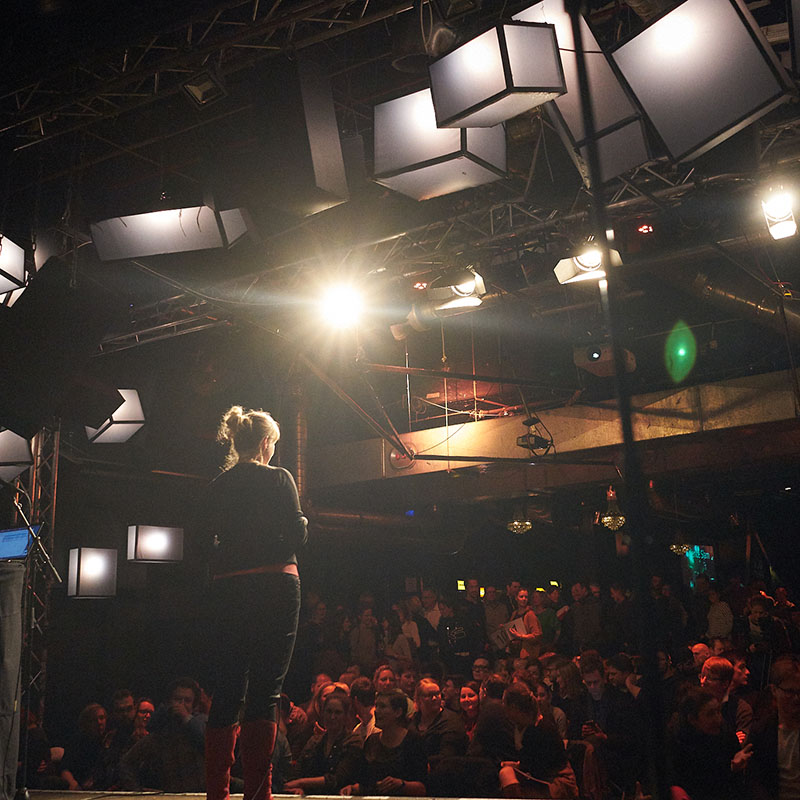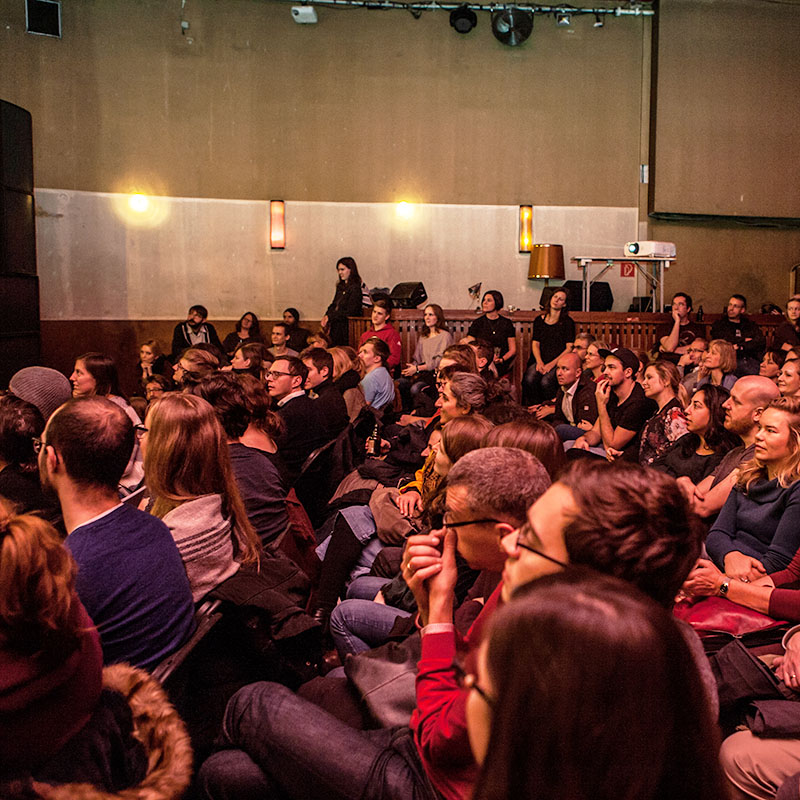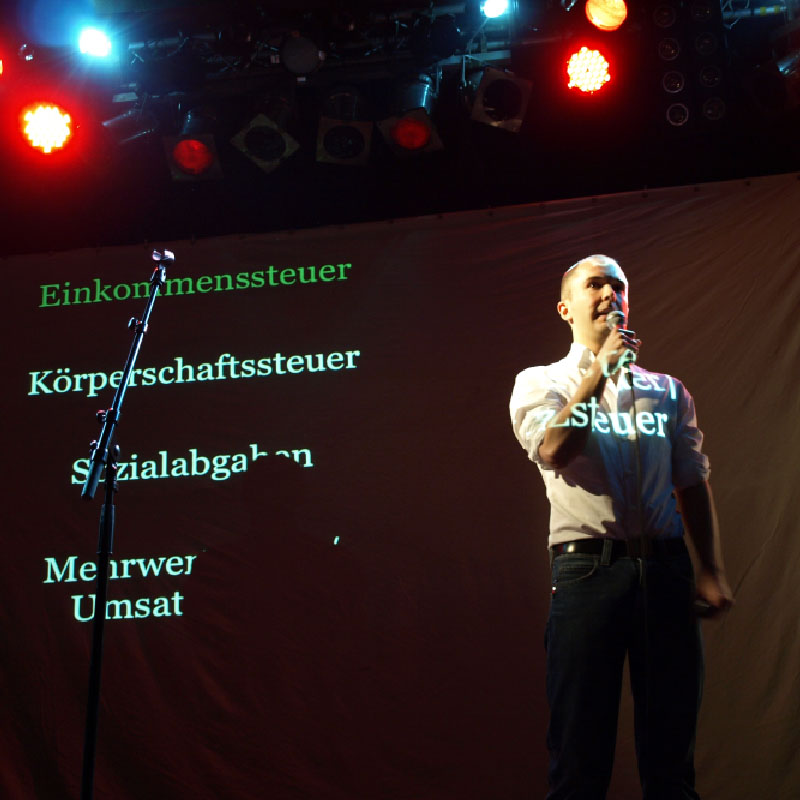What is science slam?
Science slam is a science communication format where young scientists explain their research projects in short 10-minute-talks that are easy to follow and afterwards the audience gets to vote. The important thing is not primarily the scientific outcome of their work, but to explain it in an understandable, entertaining and concise way. Science slams take place outside the university or lecture halls and instead in cultural centers, theaters or clubs, usually in the evening. So, in a science slam, the scientists leave their ivory tower and become a part of popular culture.


Success story
Science slam was invented and developed in Germany, in 2006. The very first science slam took place in Darmstadt. In 2008, independently of the event in Darmstadt, a science slam was held for the first time in the “Haus der Wissenschaft” in Braunschweig. Followed by the first science slam in Hamburg in 2009. Since then, the idea has been growing very fast. Meanwhile, science slam is an integral part of science communication in Germany and the events take place in virtually every German university town. In addition, the format is beginning to emerge in several other European countries and the first European science slam took place in Copenhagen in June 2014.
The success of the format is partly due to the fact that it provides the opportunity for direct communication between scientists and the public. This interaction encourages scientists to present their project in an appealing and understandable way and in doing so opening a window to a world rarely exposed to the general public.
Live experiments, props and creative, visual presentations are encouraged allowing the audience to experience a fully interactive event that is typically outside the norm of their own working and social environment. Ultimately, the participants are able to share, while the audience is able to experience the enthusiasm of young scientists at the forefront of scientific discovery. These scientists, at the start of their careers, rarely get the opportunity to present to such an attentive audience and they readily appreciate their opportunity to speak and share their passion for their work. It is also rare to be able to break from the normal restraints of classic scientific communication; this naturally brings a personal and more relaxed style to most presenters.
You´re the jury!
The audience is the judge and jury, voting using numbered cards. This audience participation provokes discussion as they begin to talk about the science and the presentation. There are usually 5-10 people sharing one set of voting cards, with numbers from 1 to 10. After each 10-minute-talk, the voting groups are asked to discuss how many points they want to award the speaker. During this short consultation period, an intense exchange about the presentations often takes place, so the themes are recognized more vividly than after listening alone. At the same time, it is a good starting point for socializing, since people are encouraged to talk to each other.
Be part of it!


Audience
Overall, science slams make an important contribution to science communication. The format is most suitable for young scientists, who usually opt to present their PhD- or postdoc projects. It is important to note that in science slam, the scientists do not talk about ‘textbook knowledge’, but they explain individual aspects or fundamentals of their own research projects. So, for the audience they are literally experiencing science as it unfolds.
Science slammer
Are you studying or have you already finished your PhD? Do you want to present your scientific work on stage in front of a diverse audience? We´re welcoming all scientists who want to give a speech about their project in English! Please don´t hesitate to contact us if you have further questions.
Workshops & Events
We offer workshops and organize science slams for conferences or other events.
And we are happy to provide more information if you want to start a science slam of your own!
Contact:
Dr. Julia Offe
Email: julia@scienceslam.de
Phone: +49 (0) 179 203 6765
Web: www.scienceslam.de
Frequently Asked Questions
What is a Science Slam?
A Science Slam is a fun, engaging event where scientists share their research projects through 10-minute presentations. The aim is not just to present scientific results but to explain the project in a clear and entertaining way. Scientists step out of their labs and into bars, theaters, and clubs, presenting to a general audience who acts as the jury and chooses the best presentation. It’s an exciting form of science communication.
How is a Science Slam different from a Poetry Slam?
Both Science Slams and Poetry Slams are competitive events, but while poets share their original literary works, scientists present their research. Science Slammers get ten minutes for their presentations, whereas Poetry Slammers typically have five. Poetry Slams often have multiple rounds in a single event, whereas Science Slammers usually have just one or two presentations about their project.
How does a Science Slam work?
In a Science Slam, scientists present their research in an entertaining and understandable way, each given ten minutes. A „timekeeper“ from the audience ensures presentations stay on time. Typically, five to six slammers from various fields compete, and after each presentation, the audience rates them using scoreboards or an online vote. Over 600 Science Slam presentations can be found on our YouTube channel.
How long is a Science Slam?
Each scientist has ten minutes to capture the audience’s hearts. With five to six slammers performing, plus breaks, voting, and an award ceremony, the event lasts about two hours. The term „Science Slam“ refers to the whole event, while individual presentations are called Science Slam presentations or contributions.
What makes a good Science Slam presentation?
A great Science Slam presentation is easy to understand and keeps the audience engaged. Tailor your talk to the audience’s knowledge and interests. Use everyday references, anecdotes from your research, or pop culture to illustrate your points. Remember, while entertaining, the scientific aspect should still be clear, leaving the audience with something to remember.
How do you become a Science Slammer?
To become a Science Slammer, you present your own research project. Researchers from all fields are welcome. Contact us if you’re interested, and we’ll gladly answer any questions! We also offer free online workshops for newbies!
Where do Science Slams take place?
Science Slams happen in various cities and venues. We aim to bring science to new audiences, so we host events in places like cinemas, pubs, and concert halls where science isn’t usually featured. However, we also hold them in traditional venues like museums, planetariums, and universities, each offering its unique appeal.
Who performs at the Science Slam?
Young scientists and students present their research in an engaging and understandable way. Presentations can be based on bachelor’s, master’s, or doctoral theses, or other research projects. The variety of topics and presentation styles, along with creative and humorous approaches, make Science Slams special.
When do Science Slams take place?
Public Science Slams in concert venues or theaters are usually evening events. We also organize Science Slams for conferences, company events or trade fairs, which can take place during the day. Events happen year-round, though we often take a summer break. Check out our website, subscribe to our newsletter, or follow us on social media to stay updated.
Why are Science Slams important?
Science Slams spark curiosity and inspire people of all ages to engage with science. They foster a greater understanding and appreciation of research. For scientists, these events offer valuable experience in communicating their work to a broad audience, a skill useful in many professional contexts.
What are the German Science Slam Championships?
The German Science Slam Championships are an annual event where top Science Slammers from across Germany compete. Participants qualify by placing in regional preliminaries. As in local events, each participant has ten minutes to present their project entertainingly and understandably, with the audience judging. Winners gain recognition, media opportunities, and invitations to other events, increasing interest in science and Science Slams through broader media coverage.